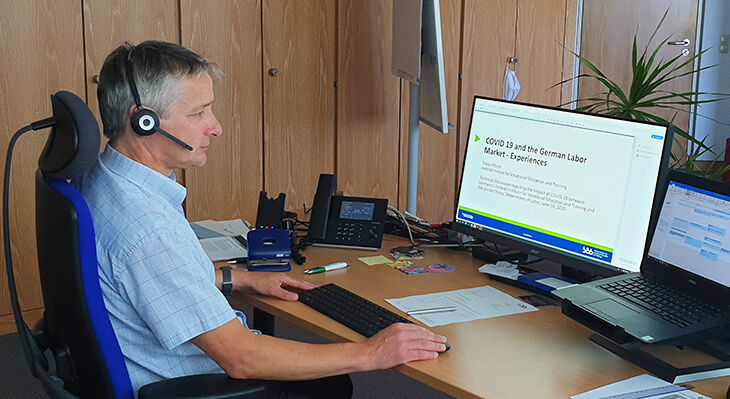German and American vocational education experts exchange ideas on the impacts of COVID-19
Inspired by the international GOVET survey regarding the impact of the coronavirus pandemic on VET and the labour market, the US Department of Labor initiated a digital round table on this topic. BIBB Director of Research Prof. Hubert Ertl opened this first well-founded exchange of expertise with a comprehensive overview of the serious situation in Germany.

The focus of the online exchange was on training, the labour market, youth employment and continuing training. In their contributions, the participating colleagues from the Federal Institute for Vocational Education (BIBB) and the US Department of Labor (DOL) working in an institutional environment certainly presented worrying interim findings. In both countries, the crisis caused by COVID-19 had immense consequences for employment and training between March and May 2020. For the German perspective, Prof. Ertl, Barbara Hemkes, Head of the “Initiatives for VET” Department, the labour market expert from the research department Tobias Maier and Michael Schulte from the “Educational Chains Initiative” described the current situation at BIBB. They also presented measures and instruments, some of which are fixed components of the German education system, while others were able to mitigate potential damage as urgently initiated responses to the coronavirus crisis. Nonetheless, in view of the declining trend in vocational training numbers of the past few years, during times of crisis the overall development of dual training is a particular concern. Lessons learned in Germany show that, due to the uncertain framework conditions of apprenticeships, young people tend to more strongly align their professional career towards academic alternatives. The “corona effect” could have a lasting impact on the recruitment of skilled professionals.
German vocational training during coronavirus
Estimates suggest a decline of some ten percent in the numbers of trainees – depending on how severe the economic downturn ends up being. Young Germans who were transitioning to the vocational training market were quickly able to fall back on virtual classes, online job interview training sessions and learning platforms. In the area of continuing training, it has become apparent that providers were and will be able to quickly react to the rapidly increased need if they were already using digital methods. Around one third of companies used the coronavirus-related downtimes for continuing training activities. Something that has proved to be beneficial for the success of the measures is interdepartmental cooperation, for example between the Federal Ministry of Education and Research (BMBF), the Federal Ministry of Labour and Social Affairs (BMAS) and the federal states, as in the case of the Federal German Government’s continuing training strategy or the educational chains and platforms such as the portal www.ueberaus.de.
Massive impact in the US as well
There was also a massive impact on the situation on the American labour market, with an increase in unemployment from around three percent to more than thirteen percent in just a few months. All occupational fields have recorded an abrupt drop in the numbers of employees since March, and in the leisure and gastronomy business the figures even fell below the level of 1990. The majority of jobseekers are in California, Texas, Georgia and New York, with a total of 23 million nationally. The hotel and services industry as well as the production of long-life products continue to be severely affected.
All the US colleagues agreed that dual and practically based training can contribute to overcoming the labour market effects of COVID-19. Known as the apprenticeship model in the US, this is based on certified training courses that are quality assured by an independent third-party organisation (Standards Recognition Entity; SRE). The government administration supports the implementation of the models with several hundred million dollars per year while at the same time seeking new models of cooperation between state and private organisations. The objective is to get young adults who had previously been excluded into training. All those involved have put in a great deal of effort to allow skilled vocational training to continue in a flexible and, in most cases, less bureaucratic way. Participants work in small groups in the workshops, while theory is taught using online tools. Access to computers, tablets and high-speed Internet was also made operationally possible. Through the YouthBuild programme, thousands of young people aged between 16 and 24 in 43 states find practical training opportunities that supported the transition from high school to the labour market in high-demand professions.
In closing, all participants agreed that joint reflection on the experiences and effectiveness of measures for overcoming the crisis can provide key impulses for policy-making. In this spirit, the participants concluded that the virtual round table marked the beginning of an active discussion that should be continued.